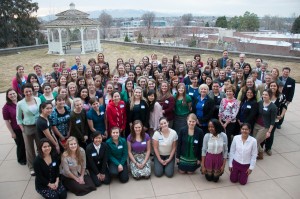Women at BYU often defy gender stereotypes by graduating in nontraditional majors and establishing programs to help future female students study what they love.
Less than 24 percent of university women nationwide earn degrees in engineering and computer sciences, according to the National Science Foundation. BYU’s female enrollment in the College of Engineering and Technology is 13 percent of the total. Females make up 10 percent of enrollment in both the information systems and finance programs at BYU.

Women in Engineering and Technology (WE@BYU), the only college-sponsored women’s initiative on campus, was organized to inform women about the opportunities in engineering and technology and provide them with the resources necessary to succeed.
Lisa Barrager, coordinator for Women Student Initiatives, said the female-to-male ratio of a major should not influence a woman’s choice of major.
“If you walk into a room and there are not that many people that look like you, that is exactly where you want to be,” Barrager said.
Barrager encouraged women to go where the opportunities are.
“When you are making choices, especially at this point in your life, choose the things that are going to open more opportunities for you rather than limit them,” Barrager said. “We can concentrate less on the bad things that are going to happen in life, turn it around, and think about the unique opportunities that we are uniquely qualified for.”
Not all women agree with Barrager. Mallorie Stratton, a junior majoring in microbiology, feels working women have a certain stigma at BYU.
“In Utah, and at BYU, it’s often hard for people to believe that women can be good mothers and have careers,” Stratton said. “When you’re a little kid and you don’t see professional women portrayed in the media and no women in your family have careers in the hard sciences, you don’t even realize it’s an option for you.”
Heather Christensen, a senior majoring in finance, has not let enrollment numbers affect her. “Honestly, there is no difference,” Christensen said. “It is not something that pokes in the back of my mind.”
Katalin Bolliger, also a senior majoring in finance, said she has never experienced discrimination because of her gender.
“I feel like this is the best place for me to grow, and I love it,” Bolliger said. “In the workplace and real world, is there ever going to be a perfect mix of every gender, race, ethnicity and religion?”
Bolliger believes some women discriminate against themselves, choosing to only study in female traditional majors.
“I am not about forcing someone to do something that they are not interested in,” Bolliger said. “I feel like there might be more women on campus who are letting prejudices or misunderstandings keep them from really excelling at a natural talent.”
Bolliger said the women of BYU should not be afraid of taking risks.
“The first lesson in finance is the higher the risk, the higher the reward,” Bolliger said. “For me, it is going to be risky and feel a little uncomfortable, but that is how you are going to get the higher reward for your future, for yourself and your family.”
Christensen encouraged women to shoot for the stars, no matter what others say.
“I want them to learn, to grow and do what they want to do,” Christensen said. “I want them to follow their dreams.”
BYU has plenty of extracurricular resources available for women exploring nontraditional majors. Clubs include Women in Business, Women in Computer Science and Women in Science.




